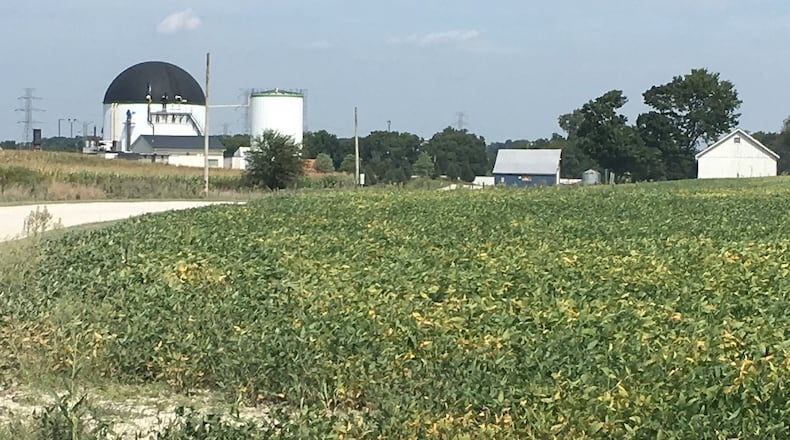Renergy appealed the order and also appealed to build two large waste storage lagoons that have sparked protests from neighbors.
The Bath Twp. Board of Zoning Appeals reviewed the company’s appeal Thursday, listening to attorneys from Dovetail, Weade and residents who live near Dovetail’s operations.
EARLIER REPORT: Bath Twp. to review large waste ponds
Renergy argued they should be allowed to continue operations and build the two storage lagoons because they are a public utility, which cannot be regulated by township zoning laws.
Mike Oberfield, the chief financial officer of Renergy, said Dovetail’s operations are two-pronged. Dovetail converts solid waste to electricity and fertilizer that is then put on farmers’ fields. The company produces one megawatt of electricity, which powers about 1,000 homes.
Dovetail accepts food waste, manure and waste from various municipalities’ waste water treatment plants. Oberfield said that if Dovetail didn’t take those materials, that they would likely go into landfills.
Witnesses for Dovetail testified that the company is taxed as a public utility by Green County and the state.
Dovetail’s attorney called John Bentine, a public utilities lawyer, to testify about whether or not he believed Dovetail is a public utility.
Bentine said that Dovetail is “clearly” a public utility because it is taxed and regulated as a public utility.
Jacob Barnes, the outside zoning inspector who said Dovetail’s operations did not fall under the agriculture zoning, said that Dovetail’s appeal to the township’s cease and desist order was the first time he saw Dovetail referred to as a public utility.
In order for Dovetail to fit into the agricultural zoning exemption, they must take half of what they produce from the Pitstick farm. Last year Dovetail took 2.5% of what it produces from the farm, Oberfield said. The most they have ever taken is a quarter of what Dovetail produces, he said.
MORE: Greene County residents try to block large waste ponds
Bath Twp. resident Jake Fulton said residents’ rights are being violated in this case.
Fulton argued that Dovetail has never been an agricultural operation, but industrial. When the company came to the township and said they planned to process Pitstick’s pig manure, that was a lie, Fulton said.
Pam Gayheart read Fulton’s statement for him.
“The Ohio EPA will not protect us, we have to protect ourselves,” Gayheart said.
In his statement, Fulton said that in Dovetail’s application to the Public Utilities Commission of Ohio, they said “no” to the question of whether they were a public utility.
About a dozen residents spoke out against Dovetail and the planned storage pits.
The attorneys for both sides have 10 days to submit closing arguments and any other findings for the zoning board to review. The board will meet again on March 3 and deliver their ruling on Dovetail’s appeals.
About the Author

